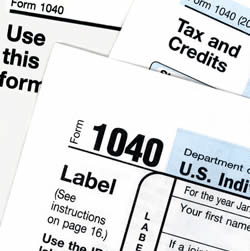Did you know that small businesses that fail to file their annual retirement plan returns can face hefty fines of up to $15,000 per return? Our tax team has helped small businesses plan and prepare their annual plan returns.
Fortunately, the Internal Revenue Service recognizes that some businesses may not even realize that this requirement applies to them. As a result, a tax penalty relief program allows them to pay $500 per return for late filings, up to a maximum of $1,500. The relief is aimed at small businesses whose plans cover a 100% owner or partners in a business partnership, and their spouses.
The U.S. Department of Labor also has a relief program for businesses that have employees. If you’re not sure whether the requirements—or the relief programs—apply to you, be sure to contact us. We can offer advice on how to remain in compliance with critical regulations and minimize your tax outlays.
Relief from a Tax Penalty You May Not Have Even Known About
Zinner & Co. Tax Department Taxes - Planning, Rules and Returns , Retirement Planning & IRAsForget the Cards, Candy and Flowers - What your CPA really wants to see in February
Zinner & Co. Taxes - Planning, Rules and ReturnsMany business owners stress over gathering receipts, recalculating figures and some even lose sleep over filling out their tax yearly organizer. But did you know, there are five things your CPA really wants to see when you submit your information so that he or she can start to work on your taxes? Let’s take a look...
If You've Ever Been Tardy on Your Taxes...
Zinner & Co. Tax Department Taxes - Planning, Rules and ReturnsYou or your business may qualify for First Time Penalty Abatement (FTA).
As you probably know, the Internal Revenue Service (IRS) can assess penalties to both individuals and businesses for not complying with the tax rules. For example,
10 Simple Things You Can Do Right Now to Reduce Your Taxes
Zinner & Co. Taxes - Planning, Rules and ReturnsFor many, the sting of holiday spending will present itself in the coming weeks by way of credit card bills and department store charges. Spending aside, the few remaining days of the year also present an opportunity to reduce your taxes, whether you are an individual taxpayer or a business owner.
Our tax team has compiled their top ten action steps to ease the burden and possibly lessen the blow of taxes owed come April 15.
Using Your Vehicle for Business? Mileage Rates Reduced for 2016
Zinner & Co. Taxes - Corporate & Business , Taxes - Planning, Rules and ReturnsThe end of year brings about changes, extenders and provisions in the world of individual and business taxation. One of the IRS changes announced for 2016 is the 3.5 cent reduction in standard mileage rates for business use of a vehicle.
New Legislation Includes Tax-Free IRA Distributions
Zinner & Co. Taxes - Planning, Rules and Returns , Retirement Planning & IRAsAs anticipated, Congress has written new legislation extending certain tax provisions. "Protecting Americans From Tax Hikes Act of 2015" is expected to be signed by President Obama within the next several days.
One important provision has permanently extended the rule which allows tax-free IRA distributions (up to $100,000) to charitable organizations, and will be retroactive to January 1, 2015. This rule allows owners of IRAs who are at least 70 1/2 years of age to direct up to $100,000 of their IRA distributions to charity.
The funds that are given to charity are counted toward the IRA owner's annual required minimum distribution, or RMD. Since these funds are going directly to charity, the distribution is not included in one's Adjusted Gross Income (A.G.I.), which helps in potentially reducing state income taxes, and may also allow certain other tax breaks to occur, due to a lower A.G.I. (i.e., medical expenses and miscellaneous itemized deductions).
Legislation affecting tax law can be confusing. The Zinner tax department is up-to-date with the latest provisions affecting individuals and businesses and is ready to help ensure your financial strategy remains favorable, If you have any questions or concerns about taxes or your IRA, please contact me at gsigman@zinnerco.com or 216-831-0733. I'm ready to start the conversation and help you guide your retirement plan.
We're Growing! Join our team as a Tax Supervisor
Zinner & Co. careers , Taxes - Planning, Rules and ReturnsDue to a number of recent promotions and to accommodate our growing workload, the firm is searching for an outstanding professional to join our tax staff as a Tax Supervisor.
Extension Periods for Various Tax Returns Revised
Barbara Theofilos, CPA, MBA Barbara Theofilos , Taxes - Corporate & Business , Taxes - Planning, Rules and ReturnsThe Highway Act changed the filing due dates of business income tax returns beginning for tax years after 12/31/15. Along with these changes the extension periods for other types of returns have also been updated. The following chart highlights these important revisions.
About Us

Since 1938, Zinner has counseled individuals and businesses from start-up to succession. At Zinner, we strive to ensure we understand your business and recognize threats that could impact your financial situation.
Recent Blog Posts
Categories
- 1031 Exchange (2)
- 401k (2)
- 529 plan (4)
- ABLE Act (1)
- account systems (3)
- accounting (8)
- Affordable Care Act (8)
- alimony (2)
- American Rescue Plan Act (1)
- Ask the Expert (5)
- Audit and Assurance Department (13)
- audits (8)
- Bank Secrecy Act (1)
- banks (1)
- Barbara Theofilos (6)
- Beneficial Ownership Information (1)
- Bitcoin (1)
- block chain (2)
- BOI (3)
- Bookkeeping (1)
- Brett W. Neate (28)
- budgets (1)
- Bureau of Worker's Compensation (12)
- Business - Management, Issues & Concerns (51)
- business income deduction (3)
- business succession (7)
- business travel expense (3)
- business valuation (5)
- capital gains (2)
- careers (7)
- cash flow (2)
- Charitable Donations (2)
- Child Tax Credit (2)
- Chris Valponi (8)
- City of Cleveland (1)
- Cleveland COVID-19 Rapid Response Fund (1)
- Cleveland Rape Crisis Center (2)
- college (3)
- Community (24)
- Compliance (1)
- Coronavirus (24)
- Corporate Transparency Act (1)
- COVID-19 (30)
- Credit card fraud (5)
- credit reporting (2)
- cryptocurrency (2)
- CTA (2)
- cybersecurity (17)
- dead (1)
- DeAnna Alger (6)
- death (2)
- debt (4)
- deductions (14)
- Deferring Tax Payments (4)
- Department of Job and Family Services (2)
- depreciation (2)
- Digital Tax Payment (3)
- divorce (4)
- DOMA (3)
- Economic Impact Payments (2)
- Economic Injury Disaster Loan (4)
- education (8)
- EIDL (1)
- electronic filing (4)
- Electronic Tax Payments (3)
- Emergency Working Capital Program (1)
- employee benefit plan auditor (1)
- Employee Leave (3)
- Employee or Independent Contractor (6)
- Employee Retention Credit (3)
- employment (2)
- ERC (3)
- Eric James (8)
- Estates, Gifts & Trusts (48)
- expenses (5)
- Families First Coronavirus Response Act (2)
- FASB (1)
- FBAR (1)
- FDIC coverage (1)
- Federal Assistance (4)
- filing (3)
- financial planning (8)
- Financial Planning - College (9)
- financing (3)
- Firm news (119)
- first responders (1)
- FMLA (1)
- foreign assets (3)
- fraud (38)
- FSA (1)
- fundraising (9)
- Gabe Adler (1)
- gift tax (5)
- HDHP (2)
- health care (3)
- home (2)
- home office (1)
- Howard Kass (2)
- HRA (1)
- HSA (5)
- identity theft (34)
- income (1)
- income tax (58)
- independent contractor (1)
- Inflation (1)
- Insurance (7)
- internal control (4)
- international (2)
- Intuit (1)
- investments (4)
- IRS (91)
- jobs (5)
- John Husted (1)
- K-1 (1)
- Laura Haines (3)
- Layoff (2)
- Layoffs (1)
- leadership (3)
- lease accounting standards (1)
- life insurance (1)
- LLC (3)
- Loans (2)
- longevity income annuities (1)
- Lorenzo's Dog Training (1)
- Magic of Lights (1)
- management advisory (3)
- manufacturing (2)
- Matt Szydlowski (3)
- medical (7)
- Medicare (2)
- mergers and acquisitions (1)
- Mike DeWine (2)
- Millennial Concepts (2)
- minimum wage (1)
- NAIOP (1)
- National Defense Act (1)
- non-profit reporting (10)
- non-profits (38)
- not-for-profit (26)
- OATC (1)
- OBBB (3)
- ODJFS (1)
- office (1)
- ohio (13)
- Ohio Accounting Talent Coalition (1)
- Ohio business owners (18)
- Ohio Department of Jobs and Family Services (4)
- Ohio Department of Taxation (7)
- Ohio Incumbent Workforce Training Voucher Program (1)
- Ohio Society of Certified Public Accountants (1)
- One Big Beautiful Bill (10)
- Online Tax Payment (4)
- Operations (2)
- OPERS (1)
- OSCPA (1)
- Overtime (2)
- owners of foreign entities (1)
- partnerships (5)
- passwords (1)
- Paycheck Protection Program (9)
- payroll (8)
- penalties (3)
- pension (2)
- personal finance (2)
- planning (4)
- ppp (7)
- Productivity (5)
- Qualified Business Income (1)
- quickbooks (10)
- real estate (14)
- record retention (2)
- records (2)
- Reporting (1)
- Republican National Convention (1)
- Retirement Planning & IRAs (54)
- Richard Huszai, CPA (5)
- RITA (1)
- Robin Baum (6)
- RRF (1)
- S Corporation (1)
- SALT (8)
- SBA (8)
- scams (14)
- SECURE 2.0 Act (1)
- security (6)
- SharedWorks (1)
- Shutdown (3)
- Silver Linings (9)
- simplified employee pension (1)
- Small Business (5)
- SMB (12)
- Social Media (1)
- social security (4)
- Speaker Series (2)
- spouse (1)
- start ups (8)
- Stay at Home Order (3)
- Steven Mnuchin (1)
- Sue Krantz (6)
- SVOG (1)
- tangible property (1)
- tax (27)
- tax avoidance (12)
- Tax Credit (7)
- Tax Cuts and Jobs Act of 2017 (31)
- Tax Exempt (1)
- Tax Holiday (1)
- Tax Interns (2)
- tax services (28)
- taxes (45)
- Taxes - Corporate & Business (107)
- Taxes - Individual (125)
- Taxes - Planning, Rules and Returns (198)
- TechCred (1)
- technology (8)
- The CARES Act (6)
- The SOURCE (1)
- tiag (3)
- transaction advisory (2)
- Treasury Department (5)
- Trump Account (1)
- tuition (3)
- U.S. Department of the Treasury (1)
- U.S. Small Business Administration (6)
- Unclaimed Funds (1)
- Unemployment Benefits (4)
- Unemployment Insurance (1)
- withdrawls (2)
- withholding (6)
- Workers Comp Billing Changes (1)
- Zinner & Co. (35)
- Zinner News (32)












